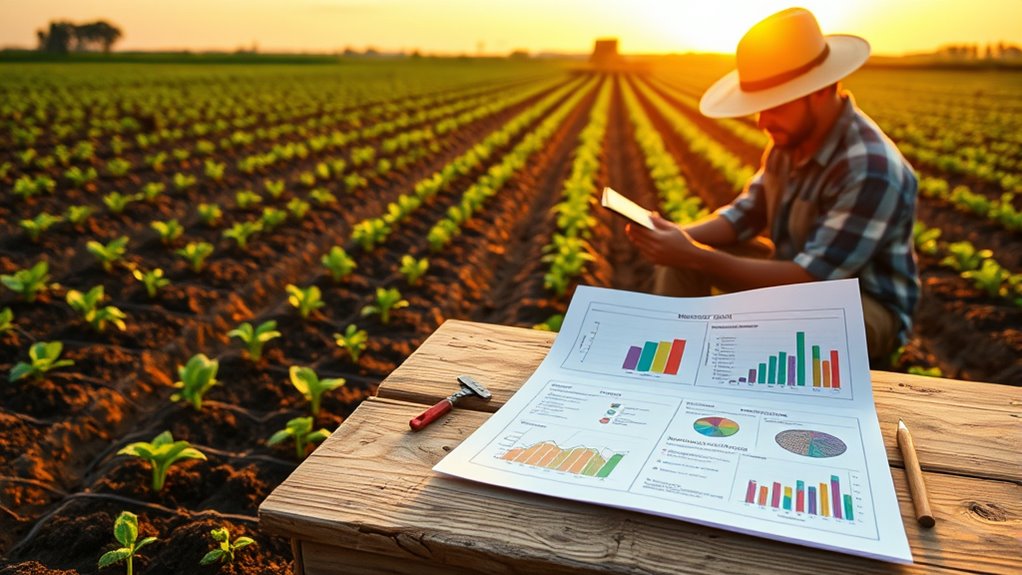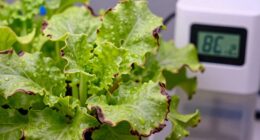If you're looking to get into farming with no experience, start by learning the basics of farming and researching local practices. Find educational resources, like courses or workshops, to build your knowledge. Create a solid business plan and consider starting small—like with a community garden or a small plot. Networking with experienced farmers can also provide valuable insights and support. Keep exploring new opportunities, and you'll discover more about how to kickstart your farming journey.
Key Takeaways
- Research local farming practices and climate to identify suitable crops and techniques for your area.
- Start small with a garden or community plot to gain hands-on experience before expanding.
- Utilize agricultural extension services and online resources for guidance and educational courses.
- Create a business plan outlining your goals, target market, and financial projections.
- Build a support network by finding mentors and joining local farming associations for advice and resources.
Understanding the Basics of Farming

Understanding the basics of farming is essential if you want to succeed in the industry. Start by preparing your land; test your soil for fertility and drainage to ensure healthy crops.
Choose crops that thrive in your local climate and meet market demand. Water management is crucial, so set up efficient irrigation systems to guarantee your plants get adequate moisture.
Implement integrated pest management techniques to keep pests at bay while minimizing chemicals. Finally, learn optimal harvesting techniques to preserve the quality of your produce.
Learning Resources and Educational Opportunities

How can you kickstart your farming journey without prior experience? Start by exploring valuable resources tailored for beginners.
ATTRA offers a six-part course on sustainable farm management, while local universities and community colleges provide courses on essential topics like land preparation and pest control.
The USDA New Farmers Website is a goldmine of information, and Farm Answers connects you with tools for new farmers.
Don't overlook online platforms like YouTube for practical insights.
Engage in educational opportunities such as NC State Extension Programs, workshops, and farm tours to gain hands-on experience.
Consider joining community gardens or incubator farms for direct involvement.
These resources will equip you with the knowledge to thrive in your farming endeavors.
The Importance of Finding a Mentor

Finding a mentor can significantly elevate your farming journey, especially if you're starting from scratch. A mentor accelerates your learning curve, teaching you successful strategies while helping you dodge common pitfalls. They can also provide insights into beekeeping practices, which can be beneficial if you choose to incorporate honey production into your farming. Additionally, as seen in the recent market shifts where new Bitcoin holders control 50% of supply, understanding market dynamics can also be crucial for farm-related investments.
They provide customized guidance tailored to your land, crops, and regional challenges, ensuring you make informed decisions. With a mentor, you gain access to invaluable networking opportunities, connecting you with agricultural professionals and resources. Additionally, mentors offer emotional support, encouraging you as you navigate the ups and downs of farming. You can find these mentors through agricultural extension services, farming associations, or even local networks. Their knowledge and experience can be the difference between a struggling start and a thriving farm. Engaging with heritage farmland tours can also enhance your understanding of sustainable practices and local food systems.
Creating a Comprehensive Business Plan

Creating a comprehensive business plan is essential for your success in farming, as it serves as a roadmap guiding your decisions and strategies.
A solid business plan is crucial for farming success, acting as a strategic roadmap for informed decision-making.
Start with an executive summary that outlines your mission and goals. In the business overview, share your farm's history and workforce details.
Conduct a market analysis to identify target markets and customer demographics, and analyze demand for your products.
Your production plan should detail operational processes and sustainability practices.
Finally, develop a financial plan that includes projections, funding needs, and risk management strategies.
Exploring Land and Equipment Options

When you're venturing into farming for the first time, exploring land and equipment options is crucial for laying a solid foundation.
You'll need to decide whether to lease or purchase land; leasing often requires less upfront capital, while buying offers long-term stability. Assess the land by testing soils and water quality to ensure it meets your farming needs.
Don't forget to research local rental rates and government resources like the USDA's Transition Incentive Program for help.
As for equipment, consider leasing to minimize initial costs or purchasing used equipment to save money.
Evaluate your specific needs and explore financing options like USDA loans to help you acquire the necessary tools to get started.
Selecting the Right Niche for Your Farm

How can you choose the right niche for your farm? Start by conducting thorough market research to identify underserved markets and emerging consumer trends.
Look for niche opportunities that align with preferences for organic, non-GMO, or specialty products. Analyze competitors to uncover gaps in the market you could fill.
Consider specialized crops like sweet corn or pumpkins, or livestock options like grass-fed meat and raw dairy, which often yield higher revenue per acre.
Don't forget to explore educational experiences, such as farm tours, to attract visitors.
Leveraging digital platforms and social media can help you effectively market your products, making it easier to reach your target audience and build a loyal customer base.
Starting Small and Testing Your Market

Starting small can be a smart strategy for new farmers eager to test their market without diving into significant financial risks. By beginning with a limited scope, you'll invest less initially, allowing for experimentation with different crops or products. This approach lets you learn from mistakes without facing major losses.
You can easily adjust your strategies based on early customer feedback, ensuring you're aligned with market demands. Involving family members in small-scale farming can also create a sense of community.
Focus on essential equipment and resources to manage your operations efficiently. Starting with pilot sales at local markets will help you gauge interest and adapt your offerings accordingly. Embrace this flexibility, and you'll build a strong foundation for future growth.
Networking With Other Farmers

Building a successful farming operation involves more than just selecting the right crops; it also requires connecting with others in the industry. Engaging with local farmers helps you understand their unique challenges and needs, laying the groundwork for collaboration.
Attend agricultural events to enhance your visibility and build trust through consistent communication. Don't underestimate digital platforms—using social media like LinkedIn can expand your reach and facilitate connections.
Consider hosting networking events to foster dialogue and community among farmers. Joining cooperatives can also provide valuable resources and advocacy.
Staying Informed and Adapting to Changes

As you delve into farming, staying informed and adapting to changes in the industry is crucial for your success. Utilize local extension offices and university resources to gain insights into best practices and regional conditions.
Regularly check government websites like the USDA for comprehensive information tailored to new farmers. Engage in online forums and attend workshops to learn about the latest techniques.
Assess environmental impacts and implement sustainable practices to adapt to climate changes. Stay updated on local regulations, ensuring compliance with necessary permits.
Lastly, leverage technology, from farm management software to agricultural apps, to optimize your operations and connect with customers effectively.
Embrace continuous learning—it's the key to thriving in the ever-evolving farming landscape.
Frequently Asked Questions
What Are the Legal Requirements for Starting a Farm?
To start a farm legally, you need to choose a business structure like a sole proprietorship or LLC, register your business name, and obtain an Employer Identification Number (EIN).
Ensure your land is zoned for agricultural use and apply for necessary licenses, such as a business license and food handler's permit.
Don't forget to consult a legal professional to navigate compliance with state and local regulations, as well as environmental standards.
How Do I Choose the Right Farming Location?
Imagine you're considering a small organic farm in your local area.
To choose the right farming location, think about proximity to markets to cut transportation costs, and assess the soil quality for healthy crops.
Check the climate suitability and water availability, too.
Evaluate the topography for ease of cultivation and consider your budget for land and infrastructure.
These factors will significantly impact your farm's success, so choose wisely!
What Insurance Options Are Available for Farmers?
When you're exploring insurance options as a farmer, you've got several choices.
Whole-Farm Revenue Protection (WFRP) covers diverse crops, while Micro Farm Insurance simplifies that for smaller operations.
Yield Protection safeguards against crop losses, and Revenue Protection ensures your revenue stays stable.
Additionally, Area Plans protect based on regional averages.
Don't forget about farm liability and property insurance, which cover your home, equipment, and livestock, providing essential security for your farming endeavors.
How Can I Finance My Farming Venture?
Financing your farming venture can feel like trying to climb Everest without gear, but it's totally doable!
You can explore government programs like Beginning Farmer Loans or USDA funding for low-interest options.
Don't overlook private financing, such as bank loans, investors, or crowdfunding.
Grants from local organizations can also lighten the load.
Consider leasing land, starting small, or finding a mentor to help you navigate this exciting journey!
What Are Common Mistakes New Farmers Make?
Common mistakes new farmers make include skipping a solid business plan, neglecting research on local regulations and best practices, and failing to budget realistically.
You might also struggle with financial management, like poor cash flow tracking or inadequate emergency funds.
Operationally, watch out for poor soil management and pest control.
Lastly, treat farming as a business to avoid haphazard decisions and ensure you adapt to market changes effectively.
Conclusion
Starting your farming journey can feel overwhelming, but remember, nearly 90% of new farmers begin with less than five acres. Picture that small plot blossoming into a thriving venture. By embracing the basics, seeking mentorship, and building a solid business plan, you'll set yourself up for success. Keep your network strong and stay adaptable, and soon you'll be growing not just crops, but a fulfilling life in agriculture. Dive in—you've got this!










